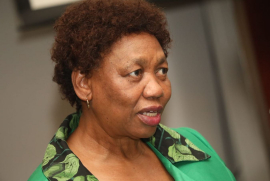
The realisation of sexuality education and sexual reproductive health rights for young people is key for the prevention of HIV, early and unintended pregnancies (EUP) and gender-based violence (GBV).
Basic Education Minister Angie Motshekga said that the prevention of these vulnerabilities among the youth will help countries in making progress in their youth development agendas.
The Minister was delivering the opening address at the United Nations Educational, Scientific and Cultural Organization’s (UNESCO) Our Rights, Our Lives and Our Future (O3) and O3 plus 2021 Annual Review and Partners’ Meeting in Fourways, Johannesburg.
The meeting is aimed at reviewing progress from the 33 programme countries in the Eastern and Southern Africa and West Central Africa.
The Our Rights, Our Lives, Our Future programme supports delivery of good quality comprehensive sexuality education (CSE) that empowers adolescents and young people (AYP) and builds agency, while developing the skills, knowledge, attitudes, and competencies required for preventing HIV, reducing EUPs, and eliminating GBV.
The objectives of the programme among others are to secure and sustain strong political commitment and support for adolescents’ and young people’s access to comprehensive sexuality education and sexual and reproductive health services across sub-Saharan Africa.
The O3 programme is run in partnership with ministries of education across the 33 countries in which the programme is implemented. It benefits from the generous support of the governments of Sweden, Ireland, Norway, and France, as well as the Packard Foundation.
Minister Motshekga added that the prevention will also contribute towards attainment of:
- Sustainable Development Goals 3, 4, and 5;
- Regional commitments such as the Eastern and Southern Africa and West Central Africa Commitment;
- The African Union Action Plan and the Southern Africa Development Community Strategy for Sexual Reproductive Health and others.
“It is significant that we are here to review, reflect on how the Our Rights, Our Lives, Our Future Programme has contributed to the promotion of the rights of young people to education, health and wellbeing in our respective countries in the last five years.
“We are all cognisant of how the programme has supported and enhanced our efforts in ensuring that all adolescents and young people have access to sexuality education and sexual reproductive health rights,” she said on Wednesday.
Motshekga emphasised that education is a protective factor and evidence has showed this especially in the face of the COVID-19 pandemic and its ramifications.
She said that children being and staying in school to complete their education is truly vital and protect them from the afore-mentioned vulnerabilities.
“To ensure that our adolescents and young people become champions of their lives and be responsible citizens that are empowered to contribute to the development of their world, achieving positive educational outcomes is extremely critical, and this is where the O3 Programme has been very beneficial,” she said.
For South Africa in particular, the Minister said that the country is thankful to have been one of the countries that has been receiving support from UNESCO through this programme.
She said that the country can attest that it has been able to up its game in strengthening the implementation of sexuality education and access to sexual reproductive health services and rights in schools.
Challenges
“We are making great strides even though we continue to experience challenges when it comes to the sexual reproductive health and wellbeing of our adolescents and youth,” Motshekga said.
The Minister said that the challenges include:
New HIV infections reported to be at about 1300 per week among adolescent girls and young women (AGYW) specifically;
Concerning numbers of births among adolescent girls, with 132 000 deliveries reported by the Health Department by young girls between ages of 10 and 19 in 2021 alone;
Gender Based violence against children having risen during COVID 19 lockdown, with the President calling it a second pandemic.
“We are however happy to say despite the above complex challenges, we have hope that we will achieve better education for all our children, and eliminate these social ills in order to report good progress, as a country towards Sustainable Development Goal 4 – that of attaining inclusive and quality education for all by 2030,” she said.
Progress
Motshekga went on to share the strides that have been made in the past five years, with the support of UNESCO and other Partners such as Global Fund, United States Agency for International Development (USAID) and others.
The DBE Policy on the Prevention of HIV, STIs and TB (2017) has been strengthened to improve implementation of comprehensive sexuality education (CSE) with linkages to sexual reproductive health services (SRHS) in schools.
She said that this has led to the development of the Scripted Lesson Plans (SLPs) for CSE which is now being rolled out in schools in Life Orientation and Life Skills Subjects.
In 2021, the DBE finalised and gazetted the Policy for the Prevention and Management of Learner Pregnancy in Schools which seek to increase efforts to prevent early and unintended pregnancies.
Though much has been achieved, the Minister said that challenges continue to exist, thus as they review progress, the country also looks forward to learn from other countries.
“Our young people who are our most precious asset for the future of our countries and regions still need us to do more and to fast-track the agenda towards realising the SDG goals and our efforts to achieve an HIV free generation by 2030,” she said. – SAnews.gov.za


